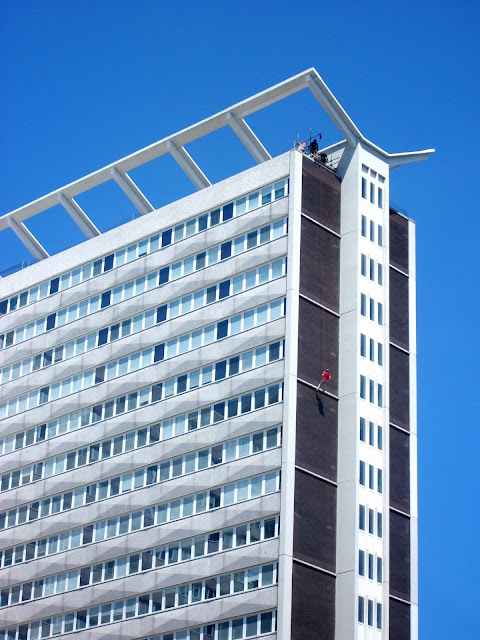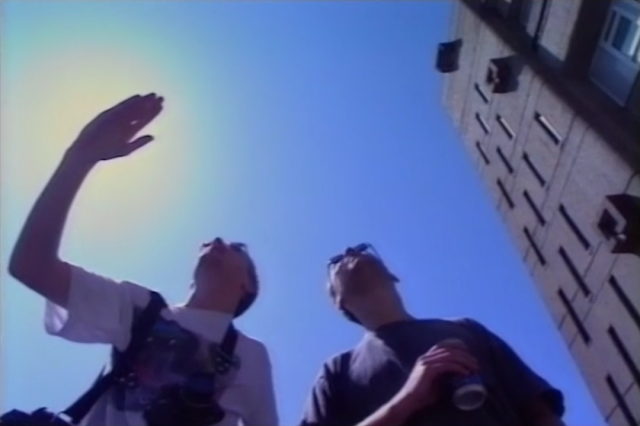Home Counties by Saint Etienne
The release of a new Saint Etienne album is always something I'm going to get overexcited about. Each of its predecessors has a strong personality: the London dreamscape of So Tough; the electronic wilderness of Sound of Water; the latin rhythms of Good Humor. Home Counties is an ode to the band's suburban homelands in the South East of England. It's come along just as the region faces meltdown: Daily Mail, Brexit, overcrowding, denial of poverty all lurking in the background on this beautiful, strange record. As a result the album's pop hooks and longing lyrics have a darker, bleaker air to them. Something has gone wrong in this sweet arcadia.
There are songs with direct appeal, of course. Something New and Underneath the Apple Tree have the awkward and raw 70s pop charm of Who Do You Think You Are, or Traffic's theme to that new town classic, Here We Go Round the Mulberry Bush. Magpie Eyes has a throatier vocal and a bleepier synth backing. The chorus is a belter, a classic Saint Etienne lyric of having your eyes set on the prize. Throughout the history of the band Sarah has sung songs about waiting for and watching heartbreak, or of being the cause of it. Another number, Out of My Mind, is like an early Sheena Easton record that's had its pristine heart broken and can't face the defiant positivity of 1981. Unopened Fan Mail is another of those hopeless love songs. Still they keep coming.
Whyteleafe, with its opening Mozart trill, turns into something quite bizarre. Imagining David Bowie if he hadn't become famous, looking at the suburban environment, station to station - Whyteleafe to Caterham, in the Toby Carvery, dreaming of Paris, Berlin and Stockholm. The details are sharply observed, the concept is extraordinary, worthy of Gordon Burn.
The driving, melodic eurodisco of Dive recalls Belle Epoque's version of Black is Black, the soundtrack to a thousand badly behaved 1970s suburban parties. Take It All In sounds like the last song of the night, the slow dance that drunken wife-swappers might regret in the morning.
It's broken up by oddities, atmospheric grabs of radio, sports and railways announcements, an elegaic choral aside called Church Pew Furniture Restorer, all rooted in a sense of the South East and its curious obsessions and the lies it tells itself. After Hebden sounds lonely and abandoned, with the wide open moors a distant memory, and it's followed by Breakneck Hill, which quickly descends into a disturbing cacophany. Heather is one of those Saint Etienne heroines, like Sylvie, but this one is distorted and haunted, almost not there, like the 'film on the sheets' heroine from Pale Movie.
A jauntier number is Train Drivers in Eyeliner, which is fun to consider in the week when one of the Brexit bastards has leaked that Chancellor Philip Hammond said that even women can drive drive trains. It feels like a jolly britflick, like Made in Dagenham, a suburban uprising turned into uplifting contemporary art. It's the most positive statement on the album, and had lots in common with the observational songs from Tales from Turnpike House. In it's mention of Whitesnake's Fool For Your Loving it joins the pop archive of their last album, Words and Music, and also reminds me of what might be my favourite of their songs, B92 from Finisterre, which namechecks The Boys are Back in Town.
As we near the end of the album we find some sadder, more reflective, darker songs. What Kind of World has the exhausted, frightened tone of What's Going On. 'This is my home but I don't feel at home tonight.' The aftermath of the brexit vote, perhaps, the huge disappointments of contemporary Britain, from fake austerity to trolling. The following song, Sweet Arcadia, is the masterpiece. It starts in familiar territory, Sarah narrating a train journey, just as she has on Saint Etienne songs in the past. But this one turns from idyllic catalogue to Wicker Man style threat, the sweet arcadia no longer sounding like the cosy nooks and havens of the lyrics, but instead falling into a spiralling hell of proggy, intoxicated keyboards. Sarah's voice is threatening, the music is anxious and seductive all at the same time. Like a 1970s made for TV ghost story, or Arthur C Clarke's Mysterious World come to marvel at the self build homes of Essex and Lewisham. Angel of Woodhatch, the final melody, is a folksy, chiming lament, an arts and crafts folly that would fit nicey into John Betjeman's Metroland.
A couple of years ago, the writer Andy Miller suggested to Bob Stanley and I that we collaborate on a series of events about Croydon, where Andy and I had grown up and Bob had lived and worked. #CroydonTillIDie was a really fun series of events, winding up in the town's celebrated arts centre, Fairfield Halls. Andy spoke beautifully about his love of suburbia, and the general disdain for it in literature and the arts. He has written a gorgeous essay that accompanies the album. Alongside that there are maps, showing crimes in the green belt, from dangerous dogs to illegally erected green belt structures. The whole is a remarkable feat, a case study for our modern southern suburbia, affectionate and worried, impressionistic and incisive.
This is a great album. They have long soundtracked urban and suburban exploration, and been the darlings of psychogeographers and flaneurs, whatever that means. But here the music is darker than I can ever recall from them, the cheery echoes of girl groups and glam stomp now come from another room where other people are having fun, while you're lost on the periphery, seduced and abandoned to the worrying mess of our modern world.
You can get the album here.











A lovely review, John.
ReplyDelete